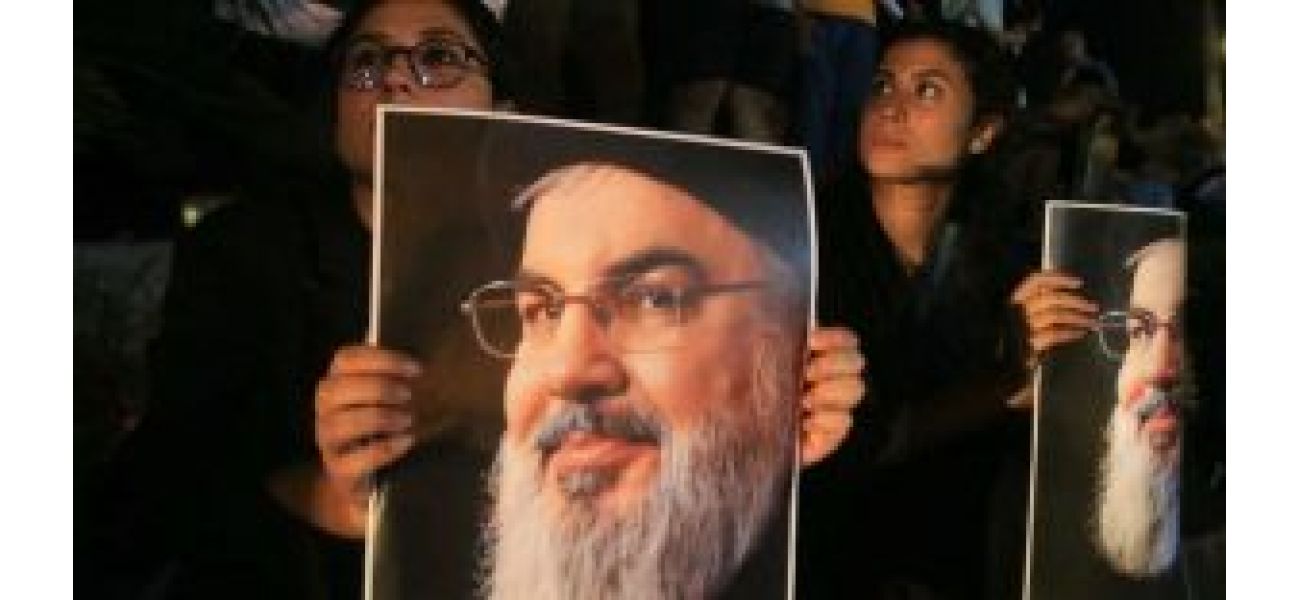The situation is getting worse.
Israel's airstrike on Hezbollah's headquarters in Beirut, resulting in the death of leader Sayyed Hassan Nasrallah, has dealt a fatal blow to hopes of peace in the Middle East.
September 30th 2024.

The Middle East has been hit with a devastating loss as Israel launched a deadly airstrike in Beirut, killing Hezbollah leader Sayyed Hassan Nasrallah on September 27th. This powerful attack was aimed at the group's central command headquarters in the southern suburbs of Beirut, with the intention of eliminating Nasrallah. While the Israeli military claims they were targeting specific individuals, they have also unfortunately caused damage to civilian areas due to the terror organization's tactic of hiding bunkers and tunnels under innocent homes.
Israel has been engaged in a long-standing battle against Hezbollah, with the goal of dismantling the terror network and weakening Iran's influence in the region. In fact, nearly 18 years ago, Israel was met with a fierce offensive led by Nasrallah, forcing them to retreat. This highlights the support that Iran provides to Shi'ite groups in the Arab world. Israeli Prime Minister Benjamin Netanyahu celebrated the killing of Nasrallah, stating that it is a crucial step in shifting the balance of power in the region for years to come. While his confidence may be admirable, it cannot be ignored that his actions have sent a clear message that those who support Hamas and Hezbollah are essentially supporting terrorist organizations that promote violence as a means of settling conflicts in the Middle East. This tense situation has the potential to escalate even further, possibly leading to a direct confrontation with Iran and their allies in various Arab countries.
Recognizing the potential danger of this situation, US President Joe Biden has called for a ceasefire, acknowledging Nasrallah's death as a form of justice for the many victims, including Americans, Israelis, and Lebanese. However, he also stands by Israel's right to defend itself. It is no secret that the escalation of this conflict may have consequences on the upcoming US presidential election in November. The precise and targeted airstrike by Israel has undoubtedly dealt a significant blow to the capabilities of Hezbollah to cause harm to Israel, posing a major challenge to Iran's position in the Arab world. As a result, Iran has called for a United Nations Security Council meeting to address Israel's actions in Lebanon and other parts of the region. Their warning against any attacks on their diplomatic facilities and representatives is a clear indication of their fear. This fear was further reinforced when news broke that the Iranian Supreme Leader went into hiding immediately after Nasrallah's death.
Iran's UN ambassador, Amir Saeid Iravani, has stated that they will not hesitate to take necessary measures to defend their vital national and security interests, using the language of imminent war. The situation appears to be spiraling out of control, as reports of Israeli strikes continue to cause casualties and displacement in Lebanon. Over the past two weeks, more than 1,000 people have lost their lives and over 6,000 have been injured as a result of these attacks. In a statement, Hezbollah has vowed to continue their battle against Israel in support of Gaza, Palestine, and their own country. Iran's Supreme Leader, Ali Khamenei, has also promised to avenge Nasrallah's death and continue the fight against Israel through other militant groups, showing clear support for a terrorist organization.
The United Nations has expressed grave concern over the escalating violence in the region. Their efforts to negotiate a ceasefire have proven unsuccessful, leaving them as mere bystanders in the Israel-Hezbollah-Hamas conflict. The organization's credibility as a global peacekeeper has been called into question, particularly when it comes to handling powerful nations and their allies. The recent events in Ukraine, where the UN failed to take effective action against Russia's invasion, further highlight the limitations of this world organization.
In conclusion, the Middle East continues to be plagued by violence and tension, with the recent events being a deadly blow to any hopes of peace, even if temporary. The death of Nasrallah has only added fuel to the fire, with the possibility of further escalation and a potential direct conflict with Iran. The role of the United Nations in this conflict has been minimal, raising questions about their ability to effectively maintain peace in the face of powerful nations. As the situation continues to unfold, the world holds its breath, hoping for a resolution that will bring an end to this senseless bloodshed.
Israel has been engaged in a long-standing battle against Hezbollah, with the goal of dismantling the terror network and weakening Iran's influence in the region. In fact, nearly 18 years ago, Israel was met with a fierce offensive led by Nasrallah, forcing them to retreat. This highlights the support that Iran provides to Shi'ite groups in the Arab world. Israeli Prime Minister Benjamin Netanyahu celebrated the killing of Nasrallah, stating that it is a crucial step in shifting the balance of power in the region for years to come. While his confidence may be admirable, it cannot be ignored that his actions have sent a clear message that those who support Hamas and Hezbollah are essentially supporting terrorist organizations that promote violence as a means of settling conflicts in the Middle East. This tense situation has the potential to escalate even further, possibly leading to a direct confrontation with Iran and their allies in various Arab countries.
Recognizing the potential danger of this situation, US President Joe Biden has called for a ceasefire, acknowledging Nasrallah's death as a form of justice for the many victims, including Americans, Israelis, and Lebanese. However, he also stands by Israel's right to defend itself. It is no secret that the escalation of this conflict may have consequences on the upcoming US presidential election in November. The precise and targeted airstrike by Israel has undoubtedly dealt a significant blow to the capabilities of Hezbollah to cause harm to Israel, posing a major challenge to Iran's position in the Arab world. As a result, Iran has called for a United Nations Security Council meeting to address Israel's actions in Lebanon and other parts of the region. Their warning against any attacks on their diplomatic facilities and representatives is a clear indication of their fear. This fear was further reinforced when news broke that the Iranian Supreme Leader went into hiding immediately after Nasrallah's death.
Iran's UN ambassador, Amir Saeid Iravani, has stated that they will not hesitate to take necessary measures to defend their vital national and security interests, using the language of imminent war. The situation appears to be spiraling out of control, as reports of Israeli strikes continue to cause casualties and displacement in Lebanon. Over the past two weeks, more than 1,000 people have lost their lives and over 6,000 have been injured as a result of these attacks. In a statement, Hezbollah has vowed to continue their battle against Israel in support of Gaza, Palestine, and their own country. Iran's Supreme Leader, Ali Khamenei, has also promised to avenge Nasrallah's death and continue the fight against Israel through other militant groups, showing clear support for a terrorist organization.
The United Nations has expressed grave concern over the escalating violence in the region. Their efforts to negotiate a ceasefire have proven unsuccessful, leaving them as mere bystanders in the Israel-Hezbollah-Hamas conflict. The organization's credibility as a global peacekeeper has been called into question, particularly when it comes to handling powerful nations and their allies. The recent events in Ukraine, where the UN failed to take effective action against Russia's invasion, further highlight the limitations of this world organization.
In conclusion, the Middle East continues to be plagued by violence and tension, with the recent events being a deadly blow to any hopes of peace, even if temporary. The death of Nasrallah has only added fuel to the fire, with the possibility of further escalation and a potential direct conflict with Iran. The role of the United Nations in this conflict has been minimal, raising questions about their ability to effectively maintain peace in the face of powerful nations. As the situation continues to unfold, the world holds its breath, hoping for a resolution that will bring an end to this senseless bloodshed.
[This article has been trending online recently and has been generated with AI. Your feed is customized.]
[Generative AI is experimental.]
0
0
Submit Comment





